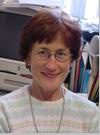Women Scientists Gather, Write at Retreat
| Posted 08/07/ 07 |
| Last year, Suzanne OConnell, associate professor of earth and environmental sciences, attended a meeting with scientists from around the world. Out of the 40 participants, she was the only female.
This was 2006, not 1973, and with an organization that had had a pretty good track record for involving women, she recalls. Its amazing to me that I was the only woman.
From July 29 to Aug. 3, 18 women from Connecticut, Massachusetts, Vermont, New York, New Jersey and even Illinois, gathered for the first GAIN writing retreat near Boston, which offered camaraderie and a focused environment for writing. The women were offered professional writing guidance from Anne Greene, director of writing programs at Wesleyan. They also shared feedback and left with a paper or grant proposal ready for submission. Our goal is to help women from all academic levels take part in a community that stresses professional development in the geosciences, OConnell explains. Through GAIN, we hope to increase the retention of women in geosciences programs here in New England, and eventually spread throughout the country. GAIN, online at www.wesleyan.edu/gain is a result of the project Building a Community of Women Geoscience Leaders, a project developed by OConnell and Mary Anne Holmes, research associate professor at the University of Nebraska-Lincoln. The entire project is funded by the NSFs three-year ADVANCE Partnerships for Adaptation, Implementation and Dissemination award of $488,367. According to the National Science Foundation, women continue to be significantly underrepresented in almost all science and engineering fields, constituting only approximately 25 percent of the science and engineering workforce at large, and less than 21 percent of science and engineering faculty in four-year colleges and universities. Women from minority groups underrepresented in science and engineering constitute only about 2 percent of science and engineering faculty in four-year colleges and universities. OConnell says recruitment of women in the sciences, and retention of women in the sciences are the two largest problems causing the low female numbers. Stereotypes, such as women are not good in math are still common, even in this day of age, she says. She mentions Lawrence Summers, who served as president of Harvard University from 2001-06, who caused uproar with women academics when he said innate differences between men and women might be one reason fewer women succeed in science and math careers. Girls, even at a young age, are still feeling that they dont belong in the sciences, and they carry these ideas, these prejudices, with them from middle school into high school and then into college, OConnell explains. Its a very hard thing to overcome, so we are not able to recruit as many women into the sciences. This is called the leaky pipe syndrome, where fewer and fewer women are sticking with an educational path in the sciences. The women who do become scientists face biological challenges. After receiving a bachelors, then masters and Ph.D and moving into an academic position, they are pressured into being awarded tenure, a period of six or seven years that can be the hardest years of your life, OConnell says. So by the time a woman receives tenure she is in her mid-thirties. OConnell says. Professionally this might be an excellent time to start having a family, but not biologically. OConnell and Holmes, both members of the Association for Women Geoscientists, will implement additional writing retreats and professional development workshops to provide women necessary skills to reach their full potential as academic and scientific leaders. These workshops will address strategies to increase department diversity, while providing a productive environment for all faculty. OConnell speaks more about problems recruiting women to the sciences in this National Public Broadcasting production at: http://stream.publicbroadcasting.net/production/mp3/wnpr/local-wnpr-604847.mp3 |
| By Olivia Drake, The Wesleyan Connection editor |


 It is this type of disparity that inspired OConnell, pictured at left, to undertake an initiative designed to retain more women in the geosciences. With support from a recent National Science Foundation award, OConnell co-created Geoscience Academics in the Northeast (GAIN), a program specifically for women geoscientists located in the Northeast.
It is this type of disparity that inspired OConnell, pictured at left, to undertake an initiative designed to retain more women in the geosciences. With support from a recent National Science Foundation award, OConnell co-created Geoscience Academics in the Northeast (GAIN), a program specifically for women geoscientists located in the Northeast.